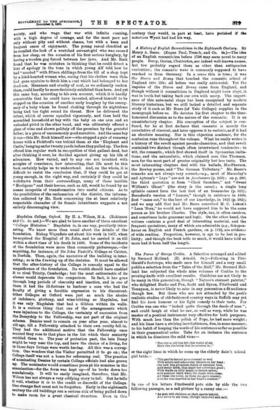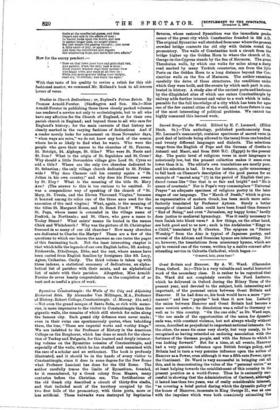The Poems of George Cralsbe. A Selection arranged and edited
by Bernard Holland. (E. Arnold. 6s.)—Following in Fitz- Gerald's footsteps, who made once for himself and a very small public a selection from the "Tales of the Hall," Mr. Bernard Hol- land has subjected the whole nine volumes of Crabbe to the pruning-knife with excellent results. Crabbites are not likely to be many in this generation, though "Nature's sternest painter," who delighted Burke and Fox, Scott and Byron, FitzGerald and Tennyson, is never likely to miss in any generation a fit audience though few. But those who are not attracted by the poet's realistic studies of old-fashioned country ways in Suffolk may yet find his keen humour or his light comedy to their taste. For Crabbe was one who "looked quite through the deeds of men " ; and could laugh at what he saw, as well as weep, while he was master of a poetical instrument very effective for both purposes. With much less than the polish of Pope, he had more weight ; and his lines have a striking inevitableness, due, in some measure, to his habit of keeping the words of his sentences as far as possible in their grammatical order. Take for an instance the sentence in which he dismisses the mild vicar— "Not one so old has left this world of sin More like the being that he entered In
or the eight lines in which he sums up the elderly deist's school girl bride-
In one of his letters FitzGerald puts side by side the two following passages, as a sad picture by a sunny one :— "As men will children at their sports behold, And smile to see them, though unmoved and cold, - This gentle damsel gave consent to wed With school and school-day dinners In her head : She now was promised choice of daintiest food, And costly dreas, that made her sovereign good ; With wza.s on hilly heath to banish spleen, And summer visits when the roads were clean. All these she loved, to these she gave consent, And she was married to her heart's content." Smile at the recollected games, and then
Depart and mix in the affairs of men : So Rachel looks upon the world, and sees It cannot longer pain, no longer please.
But Just detain the passing thought ; Just cause
A little smile of pity, or applause—
And then the recollected soul repairs Her slumbering hope, and heeds her own affairs."
Now for the sunny pendant :—
" Here on that lawn your boys and girls shaU ran, And gambol, when the daily task is done : From yonder window shall their mother view The happy tribe, and smile stall they do : While you more gravely hiding your delight, Shall cry, '0 childish,' and enjoy the sight."
With that taste of his quality to revive a relish for this old- fashioned master, we commend Mr. Holland's book to all sincere lovers of verse.























































 Previous page
Previous page